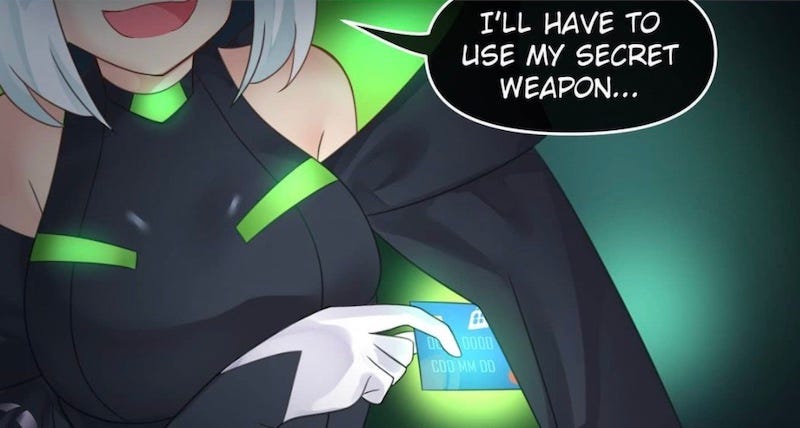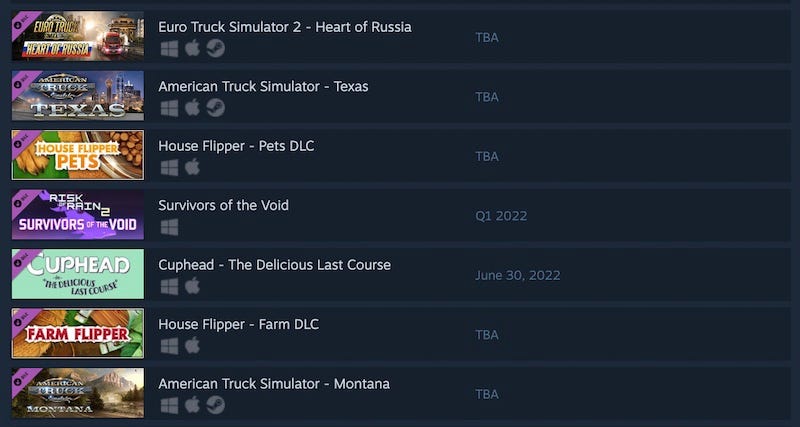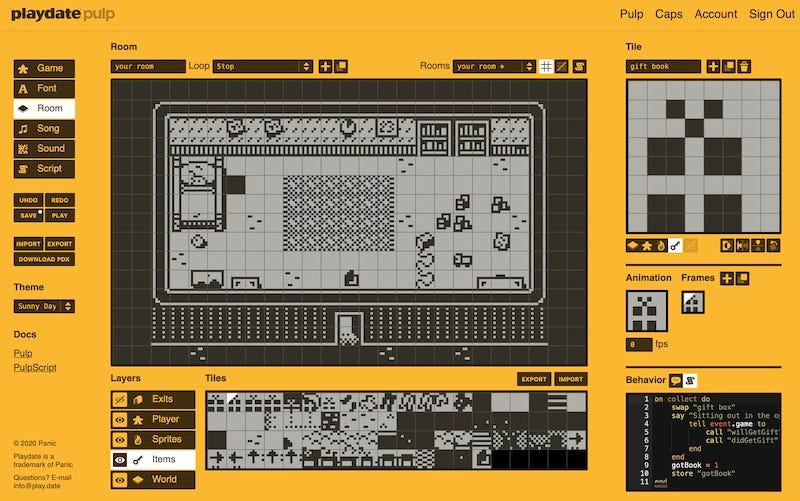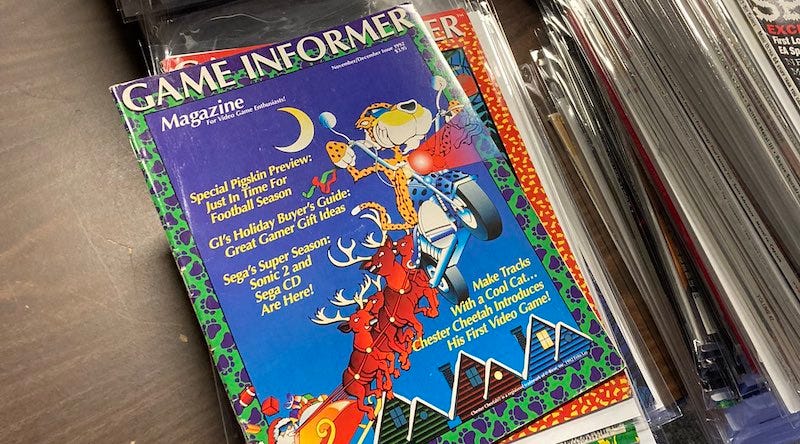What does the Microsoft/Activision deal mean for game devs and platforms?
Publikováno: 19.1.2022
It's a fair question, innit?
[The GameDiscoverCo game discovery newsletter is written by ‘how people find your game’ expert & GameDiscoverCo founder Simon Carless, and is a regular look at how people discover and buy video games in the 2020s.]
Well, this has suddenly turned into a way more eventful week than any of us expected, huh? We’ll get to that story in a second. But in the meantime, welcome to the GameDiscoverCo newsletter - we’re glad that you’re here!
Kicking off, congratulations to Francisco Tufro from Hidden People, who won our Plus subscription lottery for the New Year by becoming a new Plus member during our latest promotion. He got his paid sub extended indefinitely (which should be some time after Microsoft buys us?) for free. Now, onto the news of the week…
[INFO: don’t forget you can support us & pick up our GameDiscoverCo Plus subscription. Lots of extra perks (newsletters, exportable Steam data, Discord, etc) and you’d be helping to subsidize all the work we do on this fine free newsletter. Thanks in advance for yr support!]
The Microsoft/Activision deal -what happens now?

As many of you know, I’m a little ‘hot take’ resistant. (Sometimes to my detriment - I actually considered not leading this newsletter with the Microsoft/Activision acquisition news. That would have been pretty self-defeating, haha.)
Luckily, Polygon’s EIC Chris Plante asked me to write something up on what the deal might mean for game developers and platforms in the longer-term. And so I did exactly that, and you can read the full analysis piece on Polygon right now. Which I would highly recommend.
The larger article gets further into metaverse definitions, Microsoft vs. Apple, and all that good stuff. But I thought I’d extract three of the key takeaways here, as follows:
1. Microsoft is evolving lots of its ‘platforms’ simultaneously with the deal
Large companies need to stake out their own views on what is a stock-moving word right now. Which is why Microsoft CEO Satya Nadella said as part of the Activision Blizzard announcement: “In gaming, we see the metaverse as a collection of communities and individual identities anchored in strong content franchises accessible on every device.”
Microsoft’s point appears to be that ‘cool video game stuff for everyone on all devices’ is the way to go. Thus, by combining so many of these IAP, microtransaction, or subscription-based business models, you can:
make profitable revenue on all other people’s hardware platforms with your game platforms (such as Minecraft), while also…
creating growth and profit on game subscription platforms (Game Pass) that include games with multiple business models, including ‘pay to play once’ games.
generating revenue - but not necessarily pushing for lots of profit - on your actual game hardware platforms (the Xbox Series).
2. This is a small step in a larger path to game biz model shifts
There just won’t be major changes to how game devs see the market immediately: not today, tomorrow, nor the day the Activision Blizzard/Microsoft transaction closes.
But the deal does allow more of the industry’s biggest games to be shifted towards Microsoft’s business mode. And that will nudge the industry further towards that model, over time. If you were to ask me what the model for games is going to be in 5-10 years, I suspect it may be the following:
If you’re making a ‘pay once, play once’ PC/console video game of any significant budget, or if you want multi-million player distribution for it at launch, you may need to put it a subscription service to be successful. Whether that be Game Pass, PlayStation Plus, or others such as Netflix. These types of games will absolutely still exist, though!
If you’re making a ‘Games As A Service’ game which is paid but also has microtransactions in it, such as Grand Theft Auto/GTA Online? You have more ability to go it alone, but you may want to use a subscription service to find new players. And you get the bonus that a) the Game Pass-like service has to pay you for inclusion, and b) you’ll get more money from its subscribers over time.
If you’re a smaller game dev, and you want to keep making games with whatever business model you’d like for open, non-subscription services like Steam? Then go for it! I don’t believe Steam intends to change its business model at any time in the future. And there’s always going to be space for breakout hits created on these open services.
3. There are upsides, but there are also downsides to these shifts
In the medium term, there are clear possible disadvantages for traditional game developers here. Here’s some of the most obvious that I see, and most are Game Pass-centric:
If Xbox is moving a lot more big games into Game Pass - first from Bethesda, and now from Activision Blizzard - it’s going to give even more choice and attention on the top end of titles. If Microsoft can keep scaling its userbase, people will still check out smaller games on Game Pass. But there’s definitely a ‘big get bigger’ situation here, especially given microtransaction-centric Games As A Service are often so large, polished, and attention-grabbing.
It continues a larger trend, which is that Microsoft is highlighting Game Pass on their hardware platforms at the expense of ‘regular pay once games’ not in Game Pass. Indie devs never sold that well standalone anyhow on Xbox. But the lack of focus/discovery going forward will continue to disadvantage them.
As Game Pass and similar services get more important, the games that do make it into those services reach a massive audience. But those that don’t may have issues. And negotiation with Game Pass-like entities is essentially a disintermediation. You now have to pass another gatekeeper - a content gatekeeper, in this case - to make it to the ‘big stage’.
And here’s the article’s conclusion, which thematically references the header image I’ve inexplicably chosen for today’s newsletter - Xbox-Chan’s parental credit card:
“Xbox is an organization that… seems to care about video games and preserving the creative independence of game developers [and] is doing a great job of spinning its new role as a provider of high-quality content to everyone.
But it’s using its parent company’s cash hoard to do it, which is… disadvantaging competitors like Sony and putting their perfectly reasonable business model on the back foot. Is that fair? I guess various global governments will have to decide. And if they’re fine with that, then ... that’s capitalism, folks, and we’re all just along for the ride.”
Again, read the full Polygon piece for more analysis. And thanks to Chris and Polygon for letting me write about the deal for them.
Steam’s most-wishlisted DLC, analyzed
So, we talk about Steam wishlists entirely too much in this newsletter. But did you know there’s a subfilter of the ‘top-ranked upcoming games by wishlist’ that only shows DLC? Well, there is, and it’s kind of fun to check out.
Obviously, there are a lot of games that monetize very strongly via Steam Wallet and IAP, and so looking at chunks of game that are purely labeled as DLC is a bit of weird cross-section of what is actually making money. But it’s public, so why not see what we can learn? Thoughts:
Euro Truck Simulator 2 and American Truck Simulator - both of which discount the base game substantially and have scads of add-on content - have three of the top seven DLC, showing what a great continuing momentum you can create that way. (And ETS2 has almost 400,000 Steam reviews since 2012 - just an insane amount!)
The Russian expansion for Euro Truck Simulator 2 is #19 in wishlists out of all games & DLC combined on Steam. (We’re guessing with 300k-500k or even more wishlists?) And of course, most of them will be from existing players of the game who are genuinely interested in it, which bodes well for its launch.
Also interesting to see Frozen District & PlayWay’s House Flipper with two DLC - pets and farming-themed - in this top set of titles. And not very surprising to see Risk Of Rain 2 DLC - low profile to me, but evidently not to fans of the co-op looter shooter, and the much-delayed Cuphead ‘Delicious Last Course’ DLC round out the top DLCs on Steam by wishlist.
Anyhow, feel free to peruse the entire list. Which won’t take long, since there’s only about 30 DLC on it, from only 20+ different games. (Other games with multiple DLC on the list include Destiny 2 and Cities: Skylines.)
This is due to the fact that the entire ‘top wishlists’ list only includes the top 1,200 games/DLC out of the 7000+ currently available on Steam. So a lot of the smaller DLC just doesn’t make the cut-off to be included. The more you know!
The game discovery news round-up..
Finishing up the free newsletters for this week, we’ve got some spectacular, just spuctaculared linkadoodles to flippety-flop in your general directione, chief. Truck backing up now… *beep* *beep* beep*:
The crew at Steam are improving the ‘experimental’ Store Hubs beautification project, with help from the community. (Gotta love transparent dev!) Some good stuff in here: “Updated the SPECIALS section with better logic for determining what titles to display... this section takes popularity of discounts into account, while the previous version merely displayed the deepest discounts.”
The Game Conference Guide crew have done a super-handy year in review, for those who care about the post-COVID video game events space: “We have seen only 9 events cancelled (66% were consumer focused) compared to 21% of events in 2020. Announcements of events has been more consistent in 2021 - only 16 out of 307 in total changed the format due to restrictions or fear of new variant emerging.”
Here’s a pair of ‘things to expect in 2022’ pieces: GameAnalytics looks at the mobile market, highlighting more AR games, NFTs needing a killer app & more; Newzoo’s trends to watch in 2022 shouts out game IP becoming more valuable due to its crossmedia appeal (The Witcher TV show, Arcane, etc.)
Microlinks: Apple says App Store developers have earned more than $260 billion; Playdate’s quirky slash adorable DIY game creator Pulp (above) is now in public Beta; Ubisoft & cloud streamer Gamestream have done a deal that “allows Ubisoft to keep on improving its game streaming experience by refining how players interact with in-game menus during streamed sessions.”
Here’s a fun contextualization for the VERY high end of the Steam upcoming game wishlists chart! Dying Light 2: Stay Human, which is #2 ranked out of all unreleased games on the platform, now has 3 million Steam wishlists. Which means that, yes, Elden Ring has more. (That game is going to be a monster.)
We’ve mentioned YouTuber Skill Up - who does a witty weekly ‘this is what happened in games’ show to nearly 800k YT followers - before. But did you know he’s Tweeting about showcasing indie games on it, and you too can pitch him? Well, now you do…
Some very British ‘here’s how 2021 console sales went’ stats for you: “The No.1 console in the UK was Nintendo Switch, which overtook PlayStation 5 in the final weeks of the year. Half a million Switch consoles were sold over November and December alone, helped by a Mario Kart 8: Deluxe bundle that launched during Black Friday, and the new OLED version, which launched in October.” And actual supply!
Microlinks, Pt.2: Meta's VR division is reportedly under investigation by the U.S. Federal Trade Commission - but then, who isnt?; Microsoft quietly stopped manufacturing the Xbox One S at the end of 2020, leaving retailers to sell out their remaining stock; in the age of NFTs, here’s what the Beanie Baby craze can teach you about supply and demand.
Finally, I’ve been helping the Video Game History Foundation team send out their ‘Mystery Box’ vintage video game magazines again this week. And I’ve got to be honest, I’m proud to work in a creative industry where Chester Cheetah pulling Santa on a motorcycle can appear on a magazine cover:
[We’re GameDiscoverCo, a new agency based around one simple issue: how do players find, buy and enjoy your premium PC or console game? We run the newsletter you’re reading, and provide consulting services for publishers, funds, and other smart game industry folks.]


